
Edward Winter
(1987, with additions)

(Programme for the 1986 Olympiad in Dubai)
‘Lincoln Lucena’s bid for the FIDE Presidency was strangely low-key and ineffectual. Worse, his “running mate”, Raymond Keene, seemed to pop up almost everywhere in the chess media with statements which, let’s just say, often failed to bear scrutiny.’
Chess Duels by Yasser Seirawan (London, 2010), page 241.
As the (London) Sunday Telegraph of 30 November 1986 so attentively and laconically reported: ‘Senhor Florencio Campomanes, of Brazil, was elected unopposed in Dubai yesterday to a second term as president of the International Chess Federation when his opponent withdrew.’ Nationality apart, the news will have surprised only those whose campaign reading had been dominated by the proclamations of Senhor Campomanes’s opponents; recipients of the November 1986 Chess Life, for instance, where Mr David Levy had assured a clueless interviewer:
‘My numbers are accurate, and I have related them truthfully. If we lose, it will be because those who made commitments violated them. But right now I find it utterly inconceivable that we can lose this election.’
Raymond Keene OBE was hardly more cautious in the various campaign interviews he bestowed upon CHESS, news flash, Die Schachwoche, etc. David Levy himself was the interviewer in CHESS, but cynics who thought that as Mr Keene’s campaign manager and brother-in-law he might give the prospective FIDE General Secretary an easy ride were swiftly humbled: ‘Why is it that you have been so much more successful than other people?’, Levy badgered. To cope with the grilling, Raymond Keene resorted to low-key intellectuality, barely different from the following: ‘I am absolutely and totally convinced that a host of federations throughout the entire world are queueing up and flocking to pledge their total support for the candidacy of Lincoln Lucena, with whom I am in total agreement and am strongly supporting ... amazing enthusiasm ... I am unswervingly committed to overthrowing the totally disastrous dictator Campomanes ... summoned to Moscow at the very precise exact moment when Kasparov had just won two in a row ... CACDEC solely administered by the President ... fervent devotee of Marcos’ political speeches ... do something great for British chess ... Kasparov, a towering genius who is utterly pledged to ousting the international mafia ... fight to the death ... prestigious Chess Life ... London, the de luxe chess capital of the world ... brilliant organization of the match in London ... attracting enormous sponsorship ... luxury accommodation for FIDE pledged by the sumptuous Docklands ... sponsors falling over themselves to pledge money ... I’ve personally raised a million pounds for chess ... catastrophic chaos in the chess world ... a deluge of unanimous and total support pledged by the BCF ... a massive host of leading grandmasters throughout the entire world flocking to queue up in droves to pledge a flood of absolute and total support ...’
There was more of the same in the 24 October issue of news flash (another inquisition), but one could see it coming. Back in July 1986 Mr Keene, in his capacity as Publicity Director, had proposed to the BCF that responsibility for the magazine be transferred to the Publicity Directorate. The Federation accepted the scheme, and David Goodman (an entirely different brother-in-law) was promptly named Editor. For good measure Mr Keene’s sister, Jacqueline Levy, became Assistant Editor. The benefits soon accrued. One news flash lead story (complete with large photograph) concerned how Mr Keene had, on behalf of the BCF (of which he is Publicity Director), presented Thames TV with a special award for its programmes (of which he was adviser) about the K-K match (of which he was co-organizer). Somehow the magazine made all this sound the most natural thing in the world. Earlier, news flash had given an account of his electioneering. Or, as the report more genteelly termed it, ‘Ray Keene is currently on a goodwill tour of the Caribbean’.
While ‘Mother Teresa’ was ministering to the Caribs, the Dictator (so the November Chess Life suggested) was indulging in ‘arm-twisting’. On a less physical plane, Campomanes made only one notable contribution to the Press (in the November CHESS – sent out when everything was over). The British Gentleman, however, was to be found philanthropizing in print almost everywhere. In the May BCM he set the tone with a declaration of unswerving principle: ‘Honesty and openness is always the best policy!’ He wrote a letter to Europe Echecs promising that ‘M. Lucena et moi-même défendrons votre langue comme langue officielle de la FIDE ... Personnellement, j’ai grand plaisir à pratiquer votre langue.’ (‘Mr Lucena and I shall defend your language as an official language of FIDE ... Personally I have the great pleasure of speaking your language.’) And the final clinching pledge: ‘nous souhaitons que les pays comme la France deviennent très forts.’ (Campomanes no doubt wants countries like France to become very weak, and says so in a thick Brazilian accent.) After speedy ‘salutations cordiales’ to the Francophones, Raymond Keene was off across to issue 33 of Die Schachwoche, where, family unavailable, he gave an interview to the Dutch journalist Jules Welling. He explained the philosophy behind his General Secretary candidacy: ‘I’m not interested in being President, that is more a representative function and Lincoln can manage it better, he’s not as fat as I am – I would be glad to start work instantly to remove the Campomanes ruins.’
But would most of the 120-odd federations be glad for him to? Incomprehensibly, the majority were still declining to flock to do something great for British chess; commitments were doubtless being violated as a result of the annoyingly well-researched and well-argued FIDE Facts sheets. Mr Keene fell back on the old stratagem of taking a week or two off from his Spectator column, allowing David Spanier to wave the banner there on his behalf. He also made one last-ditch attempt from Dubai to get an Airline Ticket Scandal off the ground in his Times Olympiad reports – but to no avail. The prospect of facing the Dictator in a vote-count was too much for the Democrat; Lincoln Lucena backed out and returned home to the Philippines after assuring the world that he had no wish to exacerbate any differences that might exist within FIDE – as if anyone had ever considered Lucena/Keene capable of that.
The only thing now required was a brave face, and Mr Levy (in the following Monday’s Daily Telegraph) dutifully provided it. He explained how the utterly inconceivable had come to pass: ‘We came very close to winning, but once the Russians had made up their minds, we had no chance.’ Blaming the Commies was doubtless the best bet; perhaps no-one would remember that in the November Chess Life Mr Levy had said it would not matter if the Eastern bloc voted for Campomanes since other gains would ‘more than offset such a loss’.
Compelled to inform his Times and Spectator readers that the Lucena/Keene dream ticket had folded, Mr Keene also adopted the most sensible course. He talked only about Lucena’s failure, making no reference to his own involvement. The running mate had run. The 5 December news flash also obligingly omitted Mr Keene’s name in its report on how Lucena had conceded victory to ‘a tired-looking Campomanes’. He had probably had a difficult day dictating disastrously.
It only remained for the record to be set straight by the victims of Mr Keene’s various goodwill untruths. A start was made in issue 993-994 of CHESS, which included refutations of his ‘wild statements’ from no fewer than four people. Or, as the thwarted Gentleman himself would more elegantly put it, a host of prestigious commentators were queueing up and falling over themselves to deluge CHESS with a mass of entirely justified corrections of the completely false accusations made during an utterly disastrous and totally catastrophic campaign.
(1324)
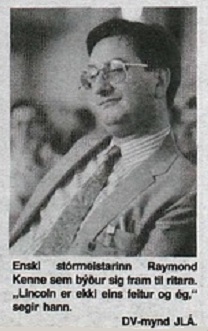
Dagblaðið Vísir, 13 September 1986, page 34
The expression ‘post-campaign sour grapes’ is certainly not to be applied to Mr Keene, whose dignity and graciousness in defeat are there for all to behold:
1) In The Spectator of 15 August 1987 (page 44) Mr Keene declared:
‘Many (including Kasparov) believed that the forthright Scandinavian [Larsen] would have made the most effective opponent to Campomanes in last year’s FIDE presidential election.’
2) In The Times of 14 October 1987 (page 5, not all editions) he said:
‘I am not overjoyed with the BCF. I think they are old-fashioned. I think that chess could become as popular as snooker and with the people in charge at the moment it cannot be done.’
3) Also in The Times (see The Super Clash, page 183) he wrote:
‘FIDE has more than 124 member nations. Many of them are mere chess illiterates but all have a vote and they were solidly behind Campomanes in his (election) campaign.’
4) In The Spectator of 18 April 1987 (page 44) Mr Keene stated, regarding Bessel Kok, the organizer of the SWIFT tournament in Brussels:
‘Many of them [of whom? – he doesn’t say] are already referring to Kok as the de facto head of FIDE – even though he has no official post.’
One has every sympathy for Mr Keene in his electoral disappointment. Burdened with the unanimous endorsement of the antiquated and ineffective British Chess Federation, he unsuccessfully campaigned with the second-rate Lucena for the votes of federations whose opinions were worthless, only to discover that Campomanes was then surreptitiously dethroned by someone else.
(1553)
Regarding point 3), below is the exact quote from page 2 of The Times, 27 April 1987:
‘FIDE has more than 124 member nations. Many of them are mere chess illiterates but all have a vote and they were solidly behind Campomanes during his campaign in the Emirates.’
From page 264 of CHESS, September 1986 (David Levy’s above-mentioned interview with Raymond Keene):
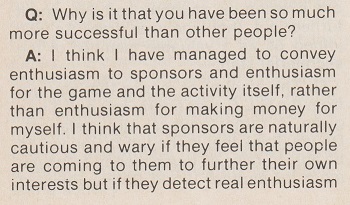
In C.N. 10856 we commented:
That question is an extreme example of a longstanding problem mentioned in Chess Thoughts: In proper journalism, the interviewer probes, politely but searchingly. In chess journalism, vacuous servility is the norm.
The word is interview, not intervertisement.
Concerning ‘Senhor Florencio Campomanes, of Brazil’ (see the above-quoted words from the Sunday Telegraph of 30 November 1986), the following by David Spanier was on page 5 of the Daily Telegraph, 25 November 1986:
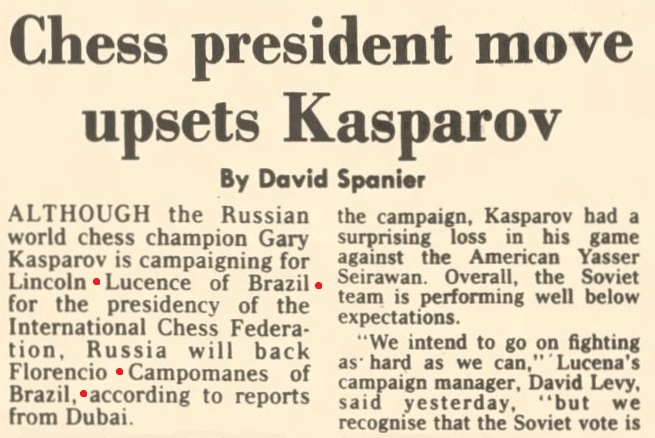
Below is the full text of the above-mentioned report in The Times, 14 October 1987, page 5:
‘Breakaway splits chess body
The British Chess Federation (BCF) is to be challenged by a new body aiming to popularize chess through television tournaments and sponsorship.
The English Chess Federation is being set up by Mr Raymond Keene, who last night resigned as publicity directory of the BCF and English Delegate to the International Chess Federation.
Mr Keene, who is chess correspondent of The Times, and also writes for The Spectator, said that his writing activities and his plans were not compatible with remaining a director of the BCF.
His resignation is the second shock to strike the quiet world of competition chess and it signals a major split in the close-knit community.
“I am not overjoyed with the BCF. I think they are old-fashioned”, Mr Keene said last night.
“I think that chess could become as popular as snooker and with the people in charge at the moment it cannot be done.”
Mr Keene denied reports that his resignation was spurred by a complaint lodged with the BCF against him by Mr Tony Miles, the Grandmaster, over Mr Keene’s role in a World Championship match in Tunis is 1985, for which he received £1,000.
Mr Keene confirmed that a BCF investigation of the complaint has been dropped after his resignation.
He said that direct membership of the ECF would open up high level chess to large numbers of people. He was being supported in his proposals by Professor Alexander Kennaway, a mathematics professor at London University, who is also resigning from the federation.’
The shambles surrounding the hasty creation of the ‘English Chess Federation’ is demonstrated by a telex sent to The Times by Professor Kennaway on 16 October 1987:
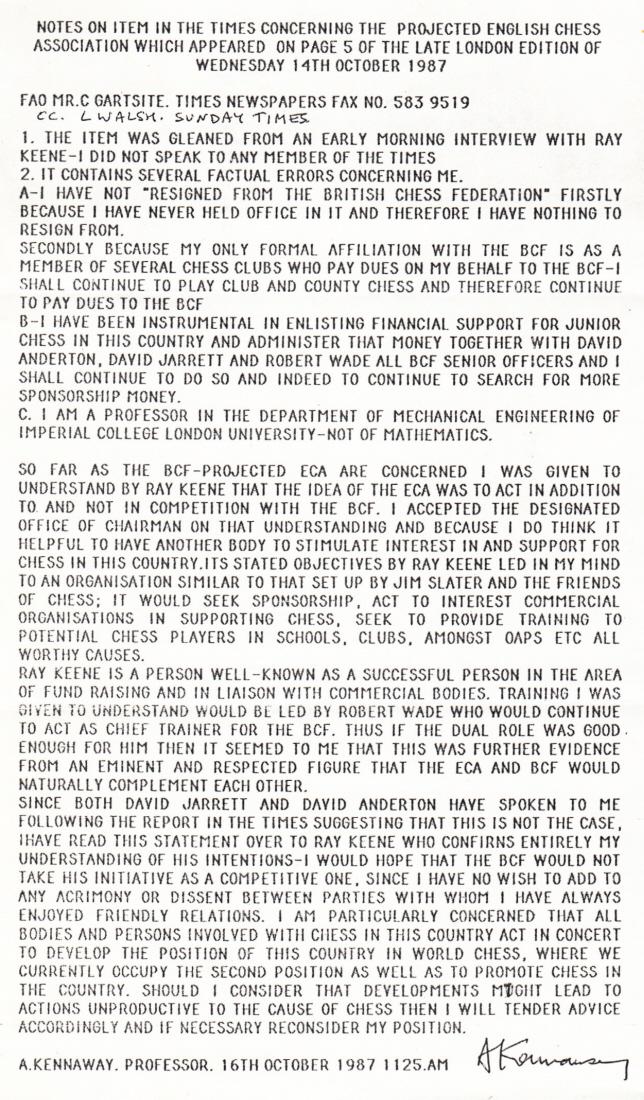
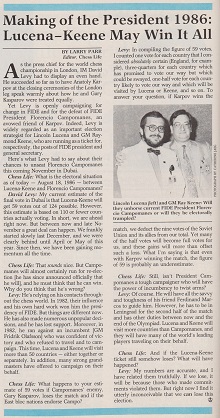
Chess Life, November 1986, page 30
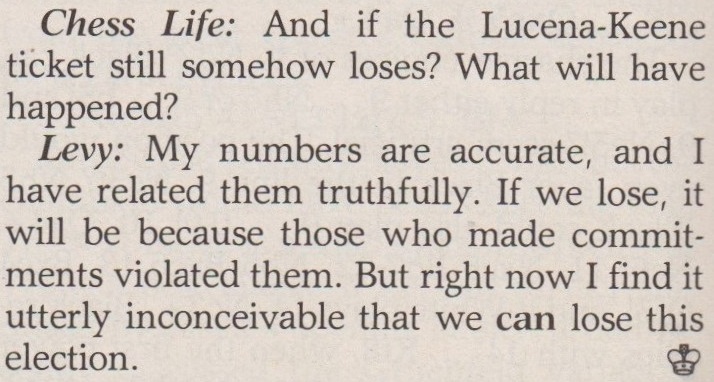
Interview with Levy
(Keene/Lucena’s campaign manager),
Chess Life, November 1986, page 30
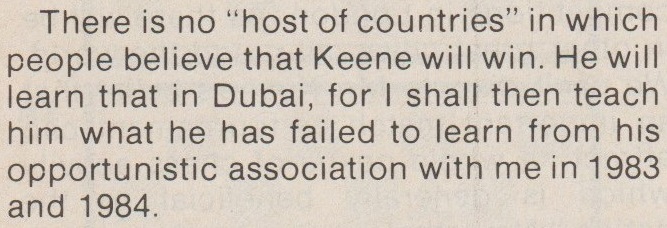
Article by Campomanes,
CHESS, November 1986, page 324
Notwithstanding all the strident predictions of electoral success made in 1986, Raymond Keene stated bizarrely in an interview on page 202 of the April 2017 BCM:
‘One of the reasons I did not stand a fair chance in 1986 is because we just had a war with Argentina.’
The Falklands War had ended over four years previously.
David Anderton died on 1 April 2022. In an article dated 22 July 2023, Raymond Keene wrote of David Anderton:
‘Anderton was a publicly plausible, but privately slippery character. Having pledged his support, and that of the BCF, for my 1986 election bid, strongly supported by Kasparov, to unseat Florencio Campomanes, the then president of FIDE, the world chess federation, Anderton struck a deal with the Filipino to stab our campaign in the back, in exchange for a top post in Campomanes’ administration.’
A spectacular example of Pravda-style reporting on behalf of Raymond Keene, by a brother-in-law:
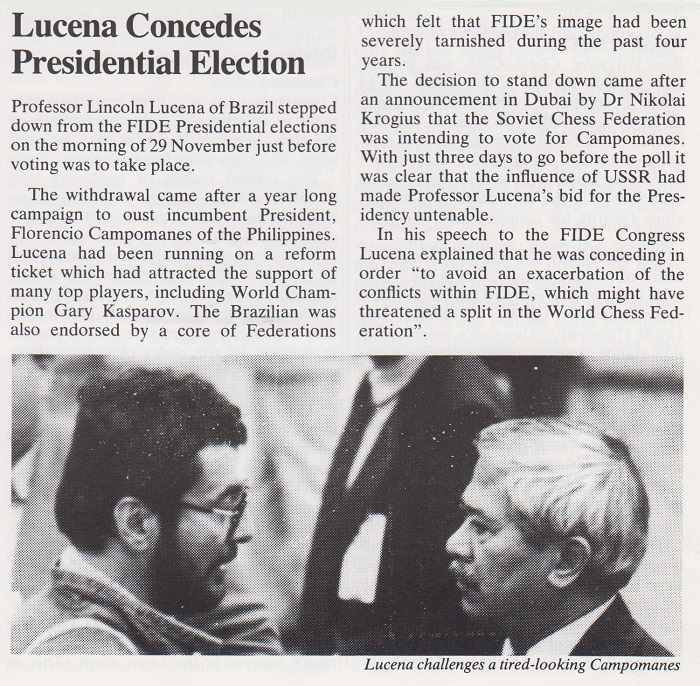
news flash, 5 December 1986, page 1
The magazine news flash contrived to avoid mentioning Raymond Keene a single time when announcing Campomanes’s victory. The Editor was David Goodman, Raymond Keene’s brother-in-law. The Advertising Manager was Jacqueline Levy, Raymond Keene’s sister.
Discussing the FIDE General Assembly in Dubai, 1986, the obituary of Florencio Campomanes in The Times, 5 May 2010 did not mention Raymond Keene’s participation in the 1986 election campaign or the last-minute withdrawal of the Keene/Lucena ticket. Instead, it asserted that Campomanes ‘went on to retain his presidency by a comfortable margin’, falsely implying that there was a vote at the General Assembly.
‘I’m not good at attention to detail’, stated Mr Keene uncontroversially on page 17 of the November 1990 CHESS.
An endnote on page 270 of Chess Explorations quoted from page 219 of Kasparov’s Unlimited Challenge (Glasgow, 1990):
‘The anti-Campo forces could muster so little support that there wasn’t even a vote.’
For the complete set of FIDE Facts sheets, see our feature article The 1986 FIDE Presidential Election.
Additional link: Ricardo Calvo: Persona non Grata.
See also the important article ‘Ex Acton ad Astra’ on pages 18-33 of the Spring 2007 issue of Kingpin.
A Times tweet posted by Raymond Keene on 16 January 2013:

To the Chess Notes main page.
To the Archives for other feature articles.
Copyright: Edward Winter. All rights reserved.